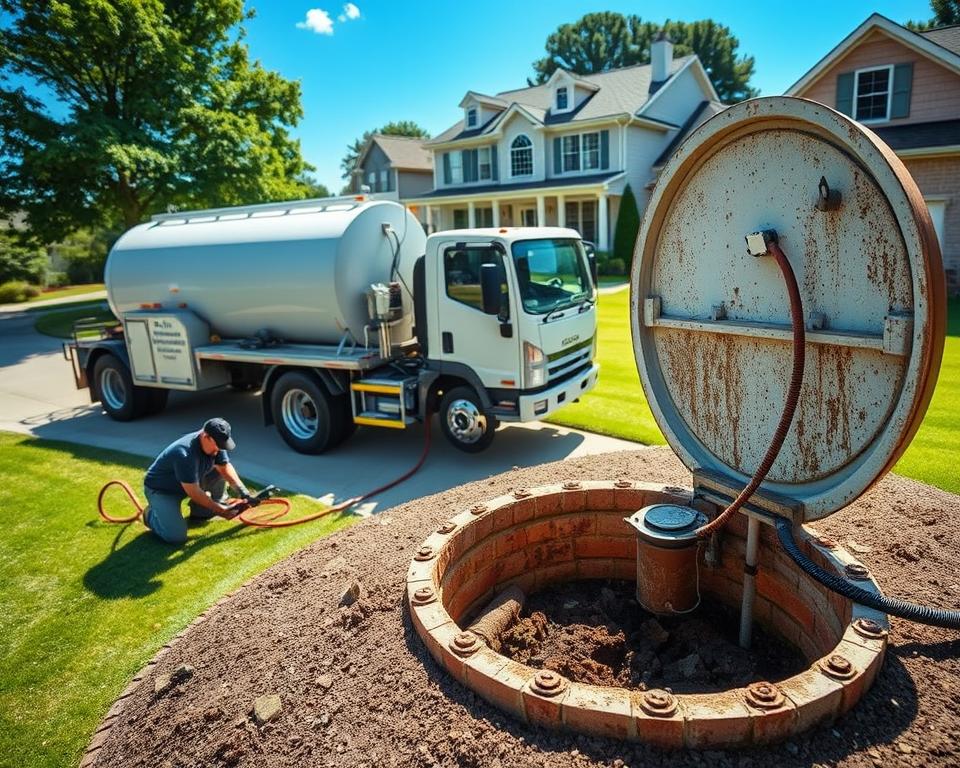Septic System Pumping
Ever pondered how often you should schedule septic system pumping to avert costly breakdowns? With in excess of 20 percent of U.S. households using septic systems, grasping their maintenance is crucial. Knowing precisely when to plan a septic tank service is key to its longevity. Additionally, homeowners have access to economical septic pumping options that ensure top-notch functionality without overspending. Below, we outline essential upkeep tips helpful for every homeowner.
Vital Takeaways
- Scheduled septic system pumping is essential for smooth functioning.
- Spotting the indicators that suggest the necessity for service can head off major issues.
- Selecting licensed septic system pumpers secures reliable maintenance.
- Budget-friendly septic pumping choices are accessible for homeowners.
- Routine inspections support peak system performance.
Getting to Know Your Septic System
A septic system serves a crucial role in handling household wastewater, comprising several important components that function in unison. The main drain line conveys wastewater from your home to the septic tank, where the process initiates. In the tank, an underground chamber, solids accumulate at the bottom, and bacteria decompose these solids, processing the waste effectively.
The treated liquid effluent next moves from the septic tank to the distribution box, where it is distributed evenly across the drain field or leach field. Here, the soil continues the filtration, further purify the wastewater. Understanding the functions of these septic system parts is critical. It empowers homeowners to supervise and care for their systems properly.
Being aware of how your septic system functions helps you implement proactive maintenance measures. It’s advisable to have scheduled meetings with qualified technicians of septic systems – septic inspection. They supply crucial insights for best operation of your system. These specialists aid in arranging the required pump-outs and checks. This diligence can considerably extend your septic system’s lifespan.
Why Septic System Maintenance Matters
Keeping your septic tank regularly is key for homeowners who wish their system to last. A well-cared-for system offers peace of mind and secures your property’s value. Without appropriate care, you’re risking system breakdowns and health dangers.
Choosing a top-notch septic pumping service is crucial. They offer timely inspections and pump-outs, clearing out sludge and scum buildup. If maintenance is neglected, urgent pumping may be required, which is expensive.
Sticking to a steady maintenance plan is smart. It includes professional evaluations and regular pumping. This preventative measure helps avoid urgent issues, providing a healthier living environment for everyone.

Warning Signs for Septic Systems
Keeping an eye on septic system issues can prevent expensive repairs and major damage. Common signs signal when your system requires a check. These consist of:
- Delayed drains throughout the house
- Pooling water in the yard above the drain field
- Unpleasant odors near the septic tank or leach field
- Unusually lush grass growth in particular areas of your yard
These symptoms could indicate problems that might result in your system failing. Acting quickly is vital. Calling in septic pumping professionals for an inspection assists. Early intervention avoids minor issues from growing into large ones. Moreover, consistent upkeep secures your system works well and has a longer life.
Septic System Pumping: Best Practices
Correct pumping of your septic tank is essential to prevent hefty clogs and backups. It’s necessary to find the ideal schedule for maintenance. Homeowners should usually plan pumping every 2 to 5 years, depending on the tank’s size and household wastewater levels. Intensive use of garbage disposals may necessitate more frequent pumping.
Employing professional pumpers guarantees your tank gets a full clean and check-up. During pumping, professionals look for any issues, such as broken baffles. Detecting these problems at an early stage heads off costlier expenses and inconveniences later. Scheduled pumping schedules and expert help secure your septic system’s trouble-free operation.
Why Routine Inspections Matter
Periodic inspections are vital for your septic system’s performance. Septic system inspections reveal small issues before they grow. Professionals advise inspections every three to five years, guided by system size and household usage. This prevents expensive fixes.
Keeping maintenance records is important for documenting your system’s condition. These records provide insights into previous inspections, repairs, and suitable intervals to schedule septic tank cleaning services. With this information, planning for future upkeep becomes simpler, maintaining septic systems in optimal shape.
Frequent inspections and detailed record-keeping not only improve system efficiency but also extend its life. This strategy secures the environment and the investment in a safe, operational home.
| Inspection Type | Recommendation Frequency | Benefits |
|---|---|---|
| Visual Inspection | Annually | Identify surface issues |
| Professional Inspection | Every 3–5 years | Assess functionality and detect problems |
| Septic Tank Pumping | Every 3–6 years | Prevent overflow and system failure |
Water-Saving Habits for a Healthier Septic System
Smart water use is essential for keeping your septic system sound. It not only supports the environment but also enhances the performance of your home’s plumbing. By adopting straightforward, yet effective, conservation methods, homeowners can decrease wastewater.
Stagger your laundry activities over the week instead of completing them in a single day. This helps the septic system to manage water better and avoids tank overflow. Installing low-flow fixtures in your kitchens and bathrooms yields considerable water savings, maintaining the water pressure up while cutting the flow rate, thus trimming the amount of wastewater produced each day.
Promptly fixing leaks is another method to support your septic system. Even a small leak can lead to a large waste of water, stressing the septic system. Through regular inspections and repairs, you greatly aid the system’s efficiency.
Emphasizing water conservation isn’t just advantageous for your septic system; it’s also a step towards sustainable living. Making such practices into everyday habits serves both your household and the planet.
Proper Handling of Household Waste
Homeowners play a vital role in keeping their septic system’s health by managing household waste appropriately. It’s critical to avoid throwing away non-biodegradable items like wipes, plastics, and other hazardous products in the system. These items can create clogs, resulting in expensive repairs and a decrease in efficiency.
Converting food scraps and organic materials is a advantageous alternative to disposing of them conventionally. This practice significantly reduces the amount of solid waste entering the septic tank. Emphasizing biodegradable waste disposal preserves the ecological balance needed for effective waste management.
It’s vital to keep an eye on what goes down the drains. Non-decomposable items can requiredemand more frequent septic tank pumping. By learning and adhering to correct waste disposal methods, you can ensure a more efficient and long-lasting septic system.
Safe Cleaning Products for Your Septic System
The health of your septic system depends significantly on your choice of cleaning products. Selecting septic-safe cleaning products is essential. These products protect the balance of beneficial bacteria that decompose waste. Many standard cleaners have harmful chemicals that jeopardize this balance, causing expensive repairs or system failure.
Homeowners should look into natural alternatives that are both effective and environmentally friendly. Common household items like baking soda, vinegar, and lemon juice are superb choices. These natural cleaners are not only capable but also support your septic system’s health.
Avoiding products that contain antibacterial agents and chlorine bleach is crucial. Such substances destroy the essential good bacteria, compromising your system’s functionality. By choosing sustainable products, you protect both the efficiency and longevity of your septic system.
The Role of Bacteria in Your Septic System
Bacteria perform a critical role in keeping your septic system functional. They break down solids on their own and improve nutrient processing. A lack of healthy bacteria can trigger system failure, bringing about costly repairs.
Homeowners can enhance their system by introducing organic additives. These products increase beneficial bacteria, making waste decomposition more effective. It’s important to choose organic additives that are helpful, not harmful, to the septic environment.
A robust bacterial community is essential to a septic system’s longevity and efficiency. It prevents solid buildup and lessens the need for frequent pumping. Emphasizing bacterial health makes waste management more effective and eco-friendly.
As a Final Point
Septic system care is essential for the longevity and functionality of your home’s wastewater system. Sticking with critical maintenance tips avoids hefty repairs. Knowing routine pumping and inspections is fundamental. This ensures your septic system remains in excellent condition.
Becoming knowledgeable of your septic system’s operation and proper methods in water and waste management is crucial. Engaging professionals like All in Sanitation provides expertise. This supports your septic system’s long-term health and offers reassurance.
Investing in proper septic maintenance today delivers future benefits. It protects your home and boosts your family’s quality of life. Emphasizing septic system care provides assurance with a well-maintained system.

